There has been a common thread in the global communist movement since 1997 and it is a system that people have heard very little to nothing about. It is called “social economy,”.
An elaborate government-funded sector that produces very little in profits but consumes billions in tax dollars. Through government tax incentives, tax credits, grants, charities, foundations, non-profits, and non-governmental organizations (NGOs), the government has been siphoning off the taxpayer’s money to fund this social economy.
There has been an elaborate money-laundering scheme designed by corporations and their foundations to offset profit margins by re-investing in their foundations, while at the same time lobbying and pushing for governmental policy changes in favour of the social economy.
The Tides Foundation, a George Soros-funded organization, refers to “The Hybrid Universe” which is shown in Figure #1. The Hybrid Universe is defined by foundations and businesses bending governments to their will. The social economy is at the very heart of global mass migration. In simplest terms, Canadians are funding their own invasion.
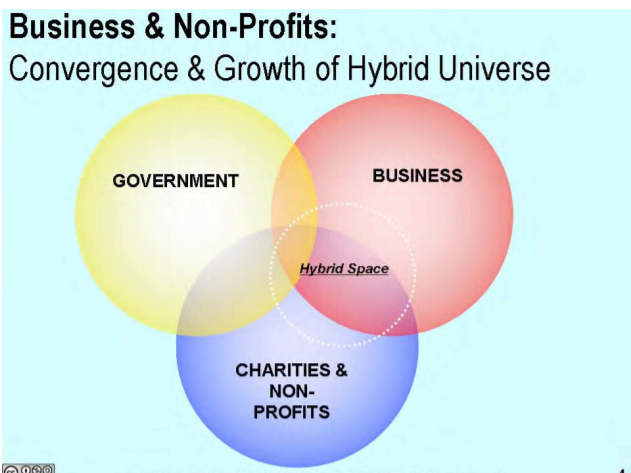
The Just Society: Liberal 1968 to mid 90s
Under Pierre Trudeau (1), the mission of a progressive social policy evolved into the goal of creating a “just society“ (2). In 1968, Trudeau used the phrase as his campaign slogan. These are the origins of what was to become known as social economy in Canada, a Liberal movement that Pierre Trudeau would become known for.
Programs that were initially intended to help our Indigenous People were instead abused by both government elitist and corporations to implement their incremental approach towards their UN Global Compact Agenda 2030. The just society was not just at all, but rather a scheme designed by the global elite to sell off Canada’s resources, its people, and flood the country with unskilled cheap labour.
The Social Economy: Liberals 1997 to 2007
In 1997, the Liberal Jean Chrétien government proposed policy changes governing the social economy and by 1999, Paul Martin’s government had implemented these policies through Human Resources and Skills Development Canada (HRSDC) (3).
Social economy was introduced into government policy through what was called “Sector Council Programs” consisting primarily of corporations armed with their own agenda and capable of influencing government policy.
A 2005 HRSDC report (3) states that “the program remains focused on working towards the achievement of four broad, long-range objectives: Increased industry learning and skills development, more informed and responsive learning to industry needs, enhanced ability to recruit, retain and address human resources needs, [and] reduced barriers to labour mobility.”
As early as 1999, the UN and Organization of American States (OAS) were working on the Global Compact for Sustainable Development (4). By 2004, Canada jumped on the social economy bandwagon and the Paul Martin government passed the Social Development Act C-22 (5).
It is worthwhile to note that the current Conservative Opposition Leader Andrew Scheer objected to this bill (5). The Bill broadened the purvey of the Minister of Social Welfare and the many social welfare programs provided by the Federal Government and, ultimately, the taxpayer.
In 2016, the OAS/UN affiliation had developed a report entitled “Irregular Migration To/Within the Americas” (6) which laid out social program requirements to accommodate this migratory movement.
The Social Economy: Trudeau Liberals
Since 2015, the Justin Trudeau Liberal government has relaunched and championed social economy once again. This is where the information becomes relevant today since we now have the UN Compact for Safe and Orderly Migration, which has been signed by the current Canadian government as of December 2018.
The Social Economy and Communism
How is this linked to communism? On the surface, the mandates within the social economy programs appear to be of benefit to Canadians. However, most of these programs are advocacy programs for Foundations and NGOs working in 3rd world countries.
None of these programs are meant to be profitable or offer any financial to return to Canadians, yet are paid for primarily by taxpayers at an estimated cost of $60 billion a year, as shown in Figure #2, again provided by the Tides Foundation in 2007. The contribution of this sector to the GDP is less than $3.2 billion. The TOTAL budget in 2007 was $242 Billion, and we spent $60 billion on these worthless programs! (7)
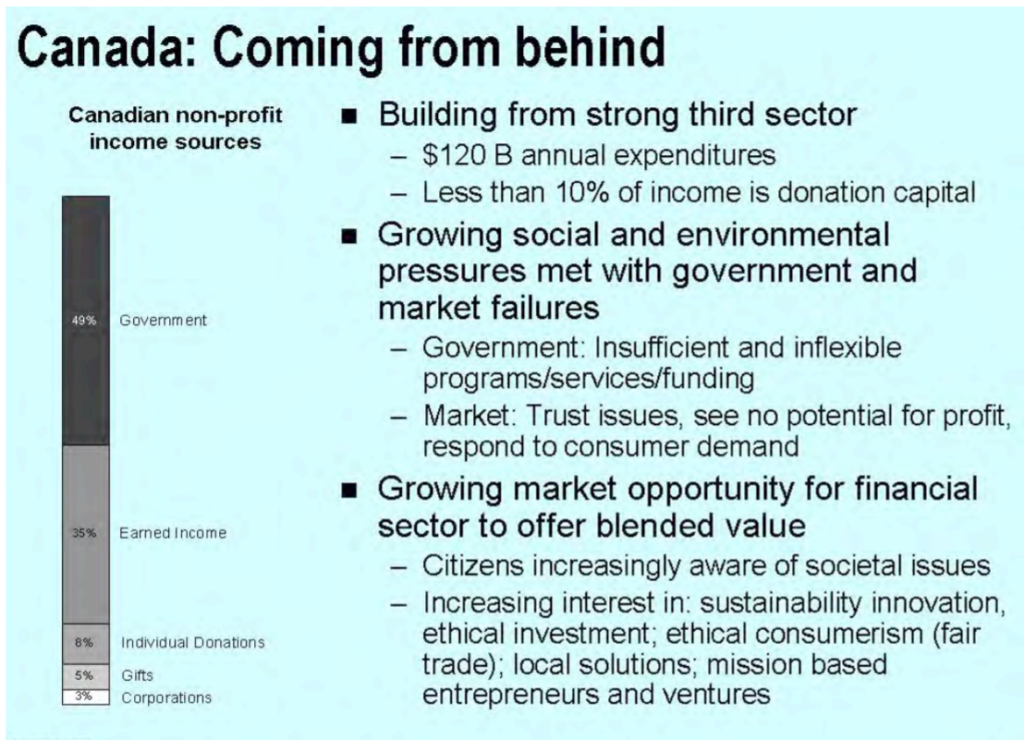
 Figure #2: This shows that the 2007 income sources to non-profits are derived from: 49% Canadian government funding, 8% donations, 5% gifts, 3% corporations, while earning only 35%
Figure #2: This shows that the 2007 income sources to non-profits are derived from: 49% Canadian government funding, 8% donations, 5% gifts, 3% corporations, while earning only 35%This is definitely an economic sector whereby costs outweigh the returns, especially for taxpayers. Corporations on the other hand and their related foundations are the only ones that benefit through tax incentives and the re-investment of corporate profits into these programs.
Further benefits are derived through massive global migrant mobility of unskilled laborers who have been flooding Europe, Canada and the United States at unprecedented levels never witnessed before. Many of these programs service migration and benefit the migrant populations (8)(9).
The social economy programs negatively impact Canadian taxpayers, (who fund these programs) and Canadian workers who are experiencing far less opportunities in full-time employment, with more and more employment emerging in part-time, seasonal work with lower wages and fewer benefits. Canadian youth unemployment is also at an alarming rate of 14.3% with fewer and fewer job openings (10).
Social economy has been implemented to foster global equity, a model for Communism supporting equity, not just within our great nation but expanded globally, whereby western society is financially supporting the third world community through taxation.
This economic model is failing Canada. Our debt is skyrocketing and our economy is on a crash course for recession (11). The social economy model failed in other countries such as Venezuela (12), which also possessed extensive social programs and offered multiple subsidies for social causes. With the fall in oil prices, such a social economy became unsustainable.
The Social Economy: Ties to the People’s Party of Canada
During the summer of 2005, the corporations involved with social economy initiatives began negotiating contracts for their activities in the event the Paul Martin Liberal government fell to the Conservatives (13).
In January 2006, the Conservative government under Stephen Harper came into power. At that time the HRSDC (Human Resources and Social Development Canada) and SSHRC (Social Studies Humanities Research Council) were governed under the Minister of Industry, who was Maxime Berrnier. On March 2006, he published a review of the SSHRC praising the merits of the social economy (14).
However, by September of 2006, Harper had defunded the social economy programs and was on record for his opposition to these programs. (15)(16)
Despite the defunding, Johanne Mennie, then Deputy Director of HRSDC & SSHRC, and the current Executive Director and Communications Director of the People’s Party of Canada (PPC), attended several meetings with the Tides Foundation of Canada that directly called for government policy interventions to implement the social economy program. One such meeting was on October 19-20, 2006 and was called “Scaling Up the Canadian Social Finance Sector (17).”
Attendees also included Edward Jackson, supported by the Desmarais Power Corporation, the World Bank, advisor to the Rockefeller Foundations (18), and Tim Brodhead, who is a former president and mentor for the Trudeau Foundation. (19) The connections continue between the who’s who of Liberal Communist Society. We will come back to Tides and other foundations again.
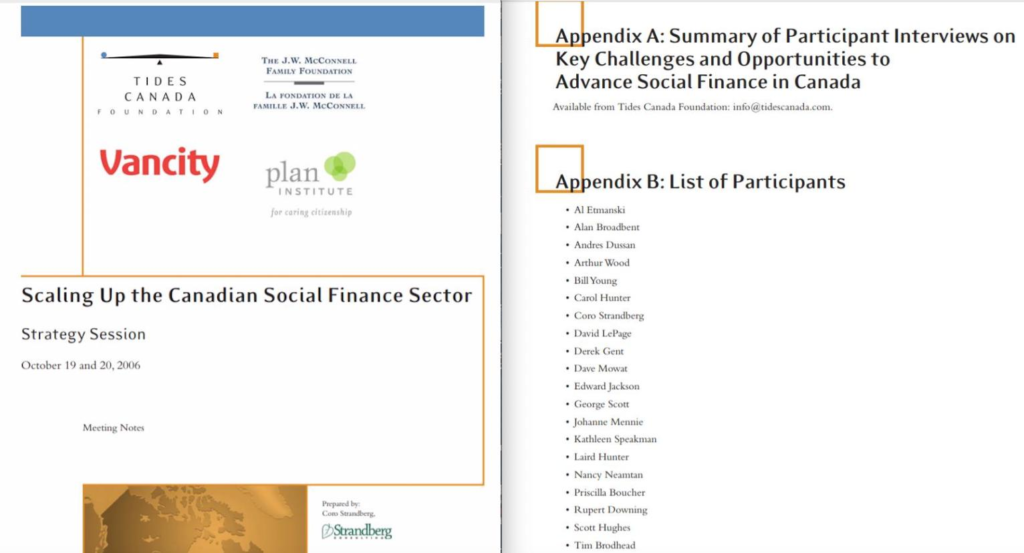
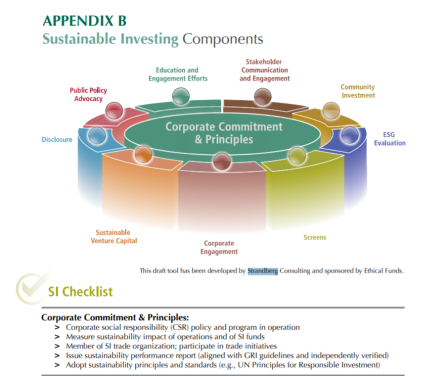
In addition, Johanne Mennie participated at a symposium held on March 26, 2007 at Carleton University called “Program-Related Investments for Foundations, Policy Makers and Non-Profits” where the following was noted (20):
HRSDC Deputy Director Johanne Mennie, who recently chaired a federal advisory committee on community finance, observed that there is a range of policy levers, including tax incentives and regulatory frameworks, that are available to governments at all levels to encourage foundations and endowments to invest in ways that are consistent with their missions.
Furthermore, at the March 26, 2007 symposium at Carleton University, there where presentations were made by Ted Jackson from Tides Foundation Canada, in partnership with HRSDC (18). Ted Jackson is also president for E.T. Jackson & Associates Ltd., an international management consulting firm that has advised on over $10 billion in investments in over 50 countries, with emphasis on strategic planning and implementation for foundations and agencies. (21)
Tides Foundation in Canada is currently under investigation by the Canadian Revenue Agency (CRA), after members of the Conservative Party of Canada (CPC) labelled the organization as a “foreign-funded” radical group. The organization funneled money through Liberal advocacy groups, particularly those advocating against the Albertan oil industry, and was also implicated in funding “third-parties” during the 2015 election, which led to the fall of the Stephen Harper’s Conservative Party (22)(23).
Through his actions, not only did Harper attempt to defund the social economy programs, he also attempted to deal with the funding structures that contributed to the empowerment of these foundations, charities and NGOs. His Economic Action Plan of 2012 called for an investment to restrict the political activities of several charities, including greater public transparency and the extent to which they may be funded by foreign sources. (24)
The Conservatives openly accused Asper, Bronfman, McCain, Bombardier, and Tides Foundation of laundering money for interest groups critical of the oils sands. The Conservatives were openly critical of charitable funding being used to thwart Canadian interests.(25)
Harper also cancelled the Sector Council Programs. These were councils and foundations that consisted of corporations within government that were introduced by the Paul Martin Liberal government and that were capable of influencing government policy and driving the social economy agenda. (Figure#5)
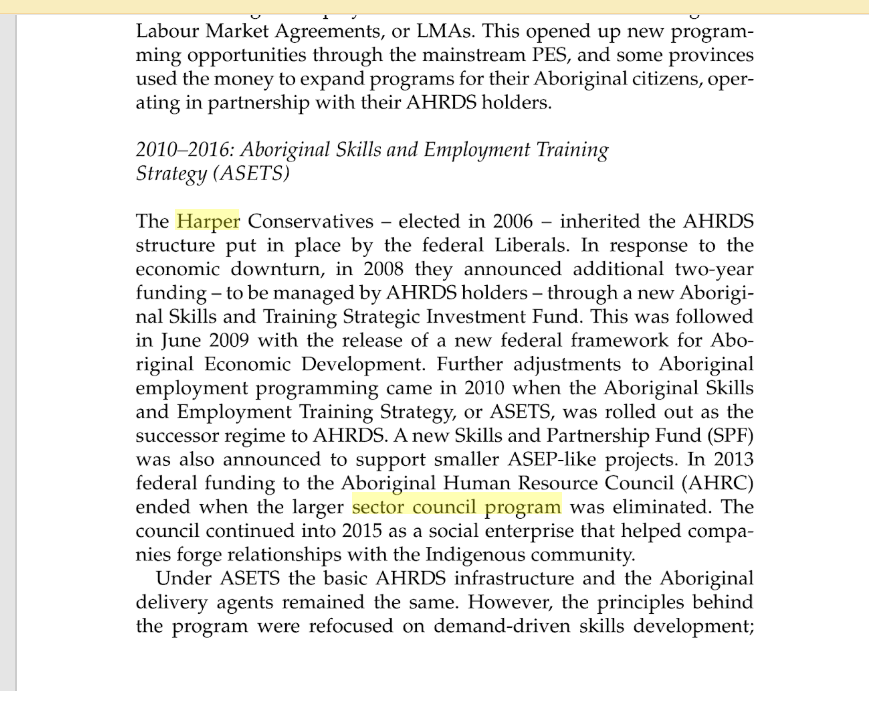
How is Johanne Mennie involved with Tides Canada? As Minister of Industry who managed the SSHRC and HRSDC, what was Maxime Bernier’s involvement with Tides Canada? And with the upcoming 2019 election, is the newly formed People’s Party of Canada (PPC) merely an extension of the Liberal Party of Canada? And what connections does George Soros have to the PPC?
The future of freedom in Canada is becoming increasing bleak – all in the name of social progress and sustainability. Canada is indeed losing its sovereignty to corporations whose global agenda is employment equity, government deregulation, and higher taxation in order to fuel mass migration and its social economy mandate. If we don’t learn this lesson from the economic situation in Venezuela, soon we too will be without medical care, homeless and living in tents, eating beans, dodging bullets in our streets, and using our currency as toilet paper.
References:
- https://en.wikipedia.org/wiki/Pierre_Trudeau
- https://en.wikipedia.org/wiki/Just_society
- http://publications.gc.ca/site/archivee-archived.html?url=http://publications.gc.ca/collections/collection_2015/rhdcc-hrsdc/HS1-17-2004-eng.pdf
- http://www.summit-americas.org/sustainable%20dev/Octubre-99-Coordination%20OAS%20and%20UN-sp.htm
- https://www.ourcommons.ca/DocumentViewer/en/38-1/house/sitting-33/hansard
- http://www.oas.org/documents/eng/press/Reporte-OIM_OEA_eng_030817_web.pdf
- https://en.wikipedia.org/wiki/2007_Canadian_federal_budget
- https://web.archive.org/web/20121017203325/http:/hrcouncil.ca/about-the-sector/overview.cfm
- https://www.canadahelps.org/en/giving-life/featured-series/community-at-the-centre-as-corporate-canada-welcomes-refugees/
- https://www150.statcan.gc.ca/n1/pub/75-006-x/2013001/article/11847-eng.htm
- https://www.narcity.com/news/experts-say-that-canada-is-at-risk-of-experiencing-a-recession-in-2019
- https://www.aljazeera.com/indepth/features/2017/05/venezuela-worst-economic-crisis-wrong-170501063130120.html
- https://carleton.ca/3ci/wp-content/uploads/CEDTAP-10-years-EN.pdf
- http://publications.gc.ca/site/archivee-archived.html?url=http://publications.gc.ca/collections/Collection/BT31-4-73-2006E.pdf
- https://www.cbc.ca/news2/background/parliament39/budgetcuts-list.html
- https://nationalpost.com/full-comment/liberals-make-big-plans-for-something-called-the-social-economy
- https://corostrandberg.com/wp-content/uploads/2006/12/scaling-up-the-canadian-social-finance-sector.pdf
- https://carleton.ca/3ci/people/edward-t-jackson/
- http://www.fondationtrudeau.ca/en/community/tim-brodhead
- https://newsroom.carleton.ca/archives/2007/03/26/carleton-hosts-symposium-on-program-related-investments-for-foundations-policy-makers-and-non-profits/
- https://www.caidp-rpcdi.ca/profile/ted-jackson
- https://www.breitbart.com/national-security/2012/05/08/soros-tides-foundation-canada/
- https://torontosun.com/2017/05/24/foreign-election-influence-happens-in-canada-too/wcm/5555bf59-778b-4296-a3d3-0db53dbd7cd7
- https://thetyee.ca/Blogs/TheHook/Environment/2012/03/29/harper-budget-charity/
- https://www.theglobeandmail.com/news/politics/wealthy-foundations-wary-of-harpers-crackdown-on-charities/article4105884/




Soros’ Tides Foundation and the Social Economy Slush Fund – Civilian Intelligence Network
[url=http://www.g9m2c0z1f2z788x7y473ms0ikn72xtr4s.org/]upxzqhvnfyg[/url]
pxzqhvnfyg http://www.g9m2c0z1f2z788x7y473ms0ikn72xtr4s.org/
apxzqhvnfyg
Start Ups Canada … also where they hatch and incubate their ‘social enterprise’ programmes – noting that the one change agent in town promotes vaxx and face muzzles as per her agenda with the big bosses… and a while back they had a military private [woman] doing a seminar thru something called Planet Hatch — some ties to Lockheed Martin with their Indigenous Start Up promotion as while ago with “JEDI” programming… should be a red flag but I saw the mayor here promoting it too – a native consulting firm is his other gig … its also something Prince Andrew and Prince Harry are promoting… start-ups are the new normal… all enterprisers will be submit to the Rothschilds’ banksters borg economy for the greater good… you get the #gibs and they get the control… if you submit.